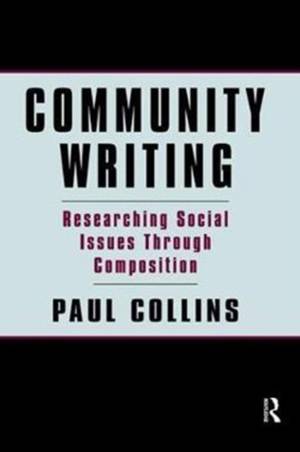
- Afhalen na 1 uur in een winkel met voorraad
- Gratis thuislevering in België vanaf € 30
- Ruim aanbod met 7 miljoen producten
- Afhalen na 1 uur in een winkel met voorraad
- Gratis thuislevering in België vanaf € 30
- Ruim aanbod met 7 miljoen producten
Zoeken
€ 263,95
+ 527 punten
Uitvoering
Omschrijving
Community Writing: Researching Social Issues Through Composition employs a series of assignments that guide students to research and write about issues confronting their individual communities. Students start by identifying a community to which they belong and focusing on problems in it, and then analyze possible solutions, construct arguments for them, decide which are likely to succeed, and consider how to initiate action. This is a primary text for first-year composition courses, covering the basics of the writing process. The assignments are recursive. Short writing assignments in each chapter build up to longer papers. Each of the assignment questions is accompanied by a guide to thinking about and writing the assigned paper, followed by a short Focus On reading that provides a brief account of community activism, a media case study, or a notable success story. The longer papers are accompanied by in-class peer reading groups. Each successive peer reading attempts a higher level of conceptual critique. By working together throughout the semester, students create increasingly adept peer groups familiar with all stages of each other's research. The book is carefully structured, but there is plenty of "give" in it, allowing instructors to be flexible in adapting it to the needs of their students and courses. Community Writing: is distinguished by pedagogy based on a collaborative, process-oriented, service learning approach that emphasizes media critique and field research on community issues chosen by individual students; answers real student questions, such as: Where do I find articles on my topic? What if evidence contradicts my hypothesis? How do I know if a source is biased?; is web-savvy--guides students into building their own Web sites, including a unique guide for critiquing the design and veracity of other people's websites; and is media-savvy--topics include media monopolies, spin control,
Specificaties
Betrokkenen
- Auteur(s):
- Uitgeverij:
Inhoud
- Aantal bladzijden:
- 212
- Taal:
- Engels
- Reeks:
Eigenschappen
- Productcode (EAN):
- 9781138465541
- Verschijningsdatum:
- 25/09/2017
- Uitvoering:
- Hardcover
- Formaat:
- Genaaid
- Afmetingen:
- 152 mm x 229 mm
- Gewicht:
- 452 g

Alleen bij Standaard Boekhandel
+ 527 punten op je klantenkaart van Standaard Boekhandel
Beoordelingen
We publiceren alleen reviews die voldoen aan de voorwaarden voor reviews. Bekijk onze voorwaarden voor reviews.











